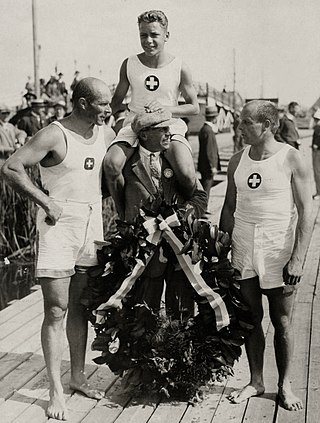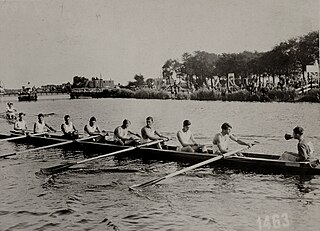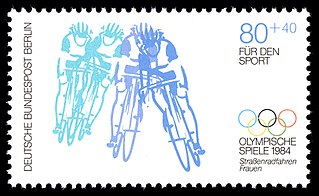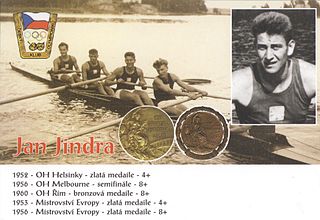
Repechage is a practice in series competitions that allows participants who failed to meet qualifying standards by a small margin to continue to the next round. A well-known example is the wild card system.

Taekwondo made its first appearance at the Olympics as a demonstration sport at the 1988 Summer Olympics in Seoul, South Korea. The opening ceremony featured a mass demonstration of taekwondo, with hundreds of adults and children performing moves in unison. Taekwondo was again a demonstration sport at the 1992 Summer Olympics in Barcelona, Spain. Taekwondo became a full medal sport at the 2000 Summer Olympics in Sydney, Australia, and has been a sport in the Olympic games since then.

Ivory Coast competed at the 1968 Summer Olympics in Mexico City, Mexico, under the IOC country code CML due to the Ivory Coast in Spanish being Costa de Marfil.

The men's sprint was a track cycling event held as part of the Cycling at the 1964 Summer Olympics programme. It was held on 17 and 18 October 1964 at the Hachioji Velodrome. 39 cyclists from 22 nations competed. Nations were limited to two cyclists each. The event was won by Giovanni Pettenella of Italy, the nation's second consecutive and fourth overall victory in the men's sprint. Sergio Bianchetto took silver, making it the second consecutive Games in which Italy had two men on the podium in the event. It was also the fifth straight Games with Italy taking at least silver. Daniel Morelon of France took bronze, the first of his record four medals in the event.

The men's eight event was a rowing event conducted as part of the 1964 Summer Olympics programme. It was held from 12 to 15 October at the Toda Rowing Course. There were 14 boats from 14 nations, with each nation limited to a single boat in the event. The event was won by the United States, returning the top of the podium after losing their eight-Games winning streak with a fifth-place finish in 1960; it was the nation's 11th overall victory in the men's eight. The defending champions, the United Team of Germany, took silver; the Germans defeated the United States in the opening round but lost the rematch in the final after the Americans advanced through the repechage. Czechoslovakia repeated as bronze medalists.
The men's sprint at the 1976 Summer Olympics in Montreal, Canada, was held from 21 to 24 July 1976. There were 25 participants from 25 nations. Following the explosion in size of the event from 1960 to 1972 when nations were allowed two cyclists each, the limit was again reduced to one competitor from each nation. The event was won by Anton Tkáč of Czechoslovakia, the nation's first medal in the men's sprint. Tkáč beat two-time defending champion Daniel Morelon of France in the final; Morelon's silver was a (still-standing record fourth medal in the event. Jürgen Geschke earned bronze to give East Germany its first medal in the event and the first medal for any German cyclist since 1952.

The men's sprint event was part of the track cycling programme at the 1924 Summer Olympics. The field consisted of 31 cyclists from 17 countries. The Vélodrome de Vincennes track was a 500-metre (1,640 ft) loop. The event was won by Lucien Michard of France, the nation's third victory in the men's sprint. His teammate Jean Cugnot earned bronze. Jacob Meijer of the Netherlands took silver, putting the Dutch team on the podium for the second consecutive Games.

The men's eight event was part of the rowing programme at the 1924 Summer Olympics. The competition, the sixth appearance of the event, was held from 13 to 17 July 1924 on the river Seine. Ten teams, each from a different nation, competed. The event was won by the United States, the nation's second consecutive and fourth overall victory in the event. Canada took silver, its first medal in the men's eight since 1908. Italy, making its debut in the event, took bronze.

The men's épée was one of eight fencing events on the fencing at the 1992 Summer Olympics programme. It was the twenty-first appearance of the event. The competition was held on 1 August 1992. 70 fencers from 30 nations competed. Each nation was limited to three fencers. The event was won by Éric Srecki of France, the nation's fifth victory in the event. France also took bronze, with Jean-Michel Henry winning the bronze medal match. France's podium streak in the event extended to four Games. Pavel Kolobkov of the Unified Team took silver.

The men's foil was one of eight fencing events on the fencing at the 1992 Summer Olympics programme. It was the twenty-first appearance of the event. The competition was held on 31 July 1992. 59 fencers from 25 nations competed. Nations had been limited to three fencers each since 1928. The event was won by Philippe Omnès of France, the nation's first victory in the men's foil since 1956 and eighth overall. Serhiy Holubytskiy of the Unified Team took silver. Elvis Gregory earned Cuba's first medal in the event in 88 years with his bronze.
The men's sabre was one of eight fencing events on the fencing at the 1992 Summer Olympics programme. It was the twenty-second appearance of the event. The competition was held on 2 August 1992. 44 fencers from 19 nations competed. Nations had been limited to three fencers each since 1928. The event was won by Bence Szabó of Hungary, the nation's first victory in the men's sabre since 1964 and 12th overall. Marco Marin took silver while Jean-François Lamour finished with the bronze. Lamour, who had won gold in 1984 and 1988, was unable to win a third title but still became only the second man with three medals in the event. Marin had also finished second in 1984; he was the 12th man with multiple medals in the sabre.

The men's coxed pair event was part of the rowing programme at the 1928 Summer Olympics. It was one of seven rowing events for men and was the fourth appearance of the event. It was held from 3 to 10 August near Sloten, Amsterdam. There were 6 boats from 6 nations, with each nation limited to one boat in the event. The event was won by the Swiss team, the nation's second consecutive victory in the event. Brothers Hans Schöchlin and Karl Schöchlin rowed, with Hans Bourquin the coxswain. Another pair of brothers took silver: France's Armand Marcelle and Édouard Marcelle. The Belgian bronze medal team consisted of Léon Flament, François de Coninck, and Georges Anthony; it was the nation's first medal in the event.

The men's coxed four event was part of the rowing programme at the 1928 Summer Olympics. It was one of seven rowing events for men and was the fifth appearance of the event. It was held from 3 to 10 August. There were 11 boats from 11 nations, with each nation limited to a single boat in the event. The event was won by Italy, the nation's first medal in the men's coxed four. The Italian team dethroned two-time reigning champion Switzerland, beating the Swiss crew in both the semifinals and the final. Switzerland's silver medal brought its podium streak in the event to three Games; the United States had its two-Games medal streak end. Poland took bronze, its first medal in the event.

The men's eight event was part of the rowing programme at the 1928 Summer Olympics. It was one of seven rowing events for men and was the seventh appearance of the event, which had been on the programme for every Olympic Games since rowing was added in 1900. It was held from 2 to 10 August 1928. There were 11 boats from 11 nations, with each nation limited to a single boat in the event. The event was won by the United States, the third consecutive victory for the Americans in the event and fifth overall. Great Britain returned to the podium after a one-Games absence in 1924 broke a three-Games medal streak, taking silver this time. Defending silver medalists Canada took bronze.
The men's sprint was a cycling event held at the 1968 Summer Olympics in Mexico City, Mexico, held on 18 to 19 October 1968. There were 47 participants from 28 nations. Each nation was limited to two cyclists. The event was won by Daniel Morelon of France, his second consecutive medal and first gold; it was also France's world-leading sixth victory in the men's sprint. His countryman Pierre Trentin, who had lost the bronze medal match to Morelon four years earlier, this year won it against Omar Pkhakadze of the Soviet Union. Between the French cyclists was silver medalist Giordano Turrini of Italy, extending that nation's streak of top-two results in the event to six Games.

The men's sprint at the 1972 Summer Olympics in Munich, West Germany, was held on 1 to 2 September 1972. There were 51 entrants from 30 nations; 5 withdrawals left 46 competitors from 27 nations. Nations were limited to two cyclists each. The event was won by Daniel Morelon of France, successfully defending his 1968 title and becoming the first man to win three medals in the event. It was France's seventh gold medal in the event, most in the world. Silver went to John Nicholson of Australia, taking the nation's first medal in the men's sprint since 1956. Omar Pkhakadze, who had finished fourth in 1968, won the bronze this time for the Soviet Union's first medal in the event. Italy's six-Games medal streak was broken.

The men's sprint cycling event at the 1984 Summer Olympics took place from 31 July to 3 August and was one of eight cycling events at the 1984 Olympics. Once again, the limit on cyclists per nation was raised to 2. The event was won by Mark Gorski of the United States, the nation's first victory in the men's sprint and first medal in the event since John Henry Lake took bronze in 1900. The final was all-American, as Nelson Vails took silver, becoming the first Olympic cycling medalist of African descent. Japan earned its first medal in the men's sprint with Tsutomu Sakamoto's bronze. France's five-Games podium streak in the event ended.

The men's eight competition at the 1936 Summer Olympics took place at Grünau Regatta Course in Berlin, Germany. The event was held from 12 to 14 August, and was won by a United States crew from the University of Washington. There were 14 boats from 14 nations, with each nation limited to a single boat in the event. The victory was the fifth consecutive gold medal in the event for the United States and seventh overall; the Americans had won every time they competed. Italy repeated as silver medalists. Germany earned its first medal in the men's eight since 1912 with its bronze. Canada's three-Games podium streak ended.

The men's coxed four competition at the 1952 Summer Olympics took place at Mei Bay, Helsinki, Finland. It was held from 20 to 23 August and was won by the team from Czechoslovakia. There were 17 boats from 17 nations, with each nation limited to a single boat in the event. The gold medal was Czechoslovakia's first medal in the men's coxed four. Switzerland earned its third consecutive silver medal, and sixth medal in seven Games dating back to 1920. The reigning champion United States took bronze.

The men's eight competition at the 1956 Summer Olympics took place at Lake Wendouree near Ballarat, Australia. It was held from 23 to 27 November. There were 10 boats from 10 nations, with each nation limited to a single boat in the event. The event was won by the United States, the nation's eighth consecutive and 10th overall gold medal in the men's eight; the Americans had won every time they competed. Canada took silver, its first medal in the men's eight since 1932. Australia repeated as bronze medalists.















